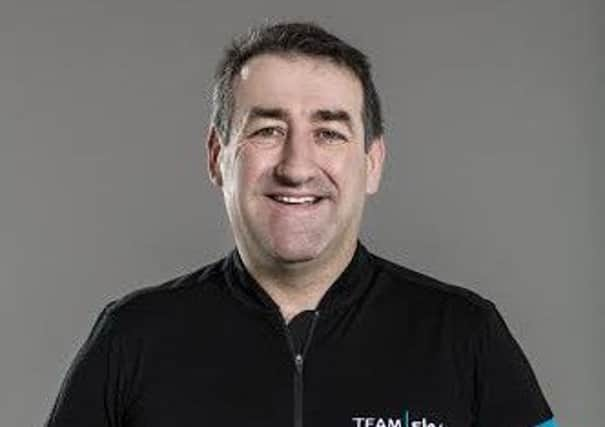Oat cuisine on the menu as riders gear up for gruelling experience


In pursuit of a successful defence of his Tour de France title this summer, Chris Froome will consume close to 8,000 calories per day.
For a man so slight it is a staggering amount, but if you get chance to watch him on the roads of Yorkshire on the first weekend of July, don’t be surprised to see the little man with the big heart stuffing his face with an energy bar.
Advertisement
Hide AdAdvertisement
Hide AdAnd he won’t be alone. For everyone at Team Sky will be doing likewise. Food is fuel for those with high energy levels and cyclists are the first in line when the buffet opens.
Not that it is a free-for-all and you might catch Sir Bradley Wiggins and Froome scrapping over the last vol au vent.
Because food intake is an exact science for a professional cyclist, and Team Sky are at the vanguard of the nutritional revolution.
What is consumed by a professional cyclist during the three weeks of a Tour de France is measured to the very mouthful. The only expectation is that it is a lot.
Advertisement
Hide AdAdvertisement
Hide AdThe man measuring those mouthfuls of carbohydrates and proteins just happens to be a Yorkshireman.
Nigel Mitchell, 47, from Barnsley, has worked in the industry for two decades since graduating from university, and has been employed in his current capacity as head nutritionist for British Cycling since 2001 and Team Sky since 2010.
He now plans what Wiggins, Froome and all the other Sky riders eat, but he has also in the past been required to stock Ed Clancy’s freezer before the London 2012 Olympics, and three times a year he can be spotted in his local supermarket buying a trolley-full of porridge.
“Three times a year I go into Barnsley Morrisons and buy 56kg of porridge oats and last year the woman on the checkout asked if I was working in a care home. I laughed and said ‘something like that’,” says Mitchell.
Advertisement
Hide AdAdvertisement
Hide Ad“Because that’s one of the funny things about my role; it can be very scientific but at the end of the day it’s about feeding people.
“It’s taking that complicated science and putting it into very simple, practical things.
“My job is about creating the best nutritional environment for the riders from a performance point of view.”
Cycling has been at the forefront of the nutritional revolution in sport and Sky have led the peloton among the rest of the professional teams.
Advertisement
Hide AdAdvertisement
Hide AdAlready known for the scientific way they plan and prepare, the amount of food consumed by a rider during a grand tour is as vital as the height of their saddle and the air in their tyres.
For a mountain stage which could see a rider spend six hours in the saddle, Mitchell says they will be fed between 7,000 and 8,000 calories.
For a flatter stage it might be slightly less, but even then it is still between 4,000 and 6,000 calories.
“When they’re in the mountains the food becomes a lot simpler purely because of the digestion,” says Mitchell.
Advertisement
Hide AdAdvertisement
Hide Ad“In the mountain stages they’ll be eating a lot more rice, chicken, fish, and then on the flatter stages we give them red meat, anything up to a couple of pounds a week, and they’ll have a fillet steak for instance.
“When they’re racing for three weeks we don’t want them to have chicken and rice every day so it’s as much about feeding the mind as it is feeding the body.
“A typical day would be going down for breakfast at about 8am. Breakfast would be porridge, an omelette, some juice, and the chef will also make fresh vegetable juice because that’s a good way of getting all the nutrients in. They’ll have some yoghurt and a bit of cheese. It’s normal foods, but the big energy food is the porridge.
“On the bus to the start of the stage they’ll be snacking on flapjack bars and energy bars.
Advertisement
Hide AdAdvertisement
Hide Ad“During the race they’re eating from the word go, taking on energy bars and rice cakes. At the beginning of the race they eat more solids, then when the intensity goes up they switch to the gels and the drinks.
“After the race the riders are given a protein recovery drink after they’ve finished and then after that they’ll have food on the bus, which again is rice and maybe some potatoes.
“Then after their massage it’ll be down for evening meal which might be fillet steak with potatoes, pasta and vegetables. Mozzarella cheese, tomato and basil is a popular starter and then desert is fruit salad and natural yoghurt.
“And even before bed it’s another protein shake and a camomile tea. What you’ve got to remember is they’re racing the day after so you’re constantly feeding them throughout.
Advertisement
Hide AdAdvertisement
Hide Ad“Even the opening stages in Yorkshire are stages that will catch a few people out so they’re going to have to be well-fuelled before those days.
“It gets difficult during the third week when everyone’s tired and they can become a little bit complacent. So you have to keep on at them. You know the ones who need pushing and encouragement as opposed to those who are trained to do it.”